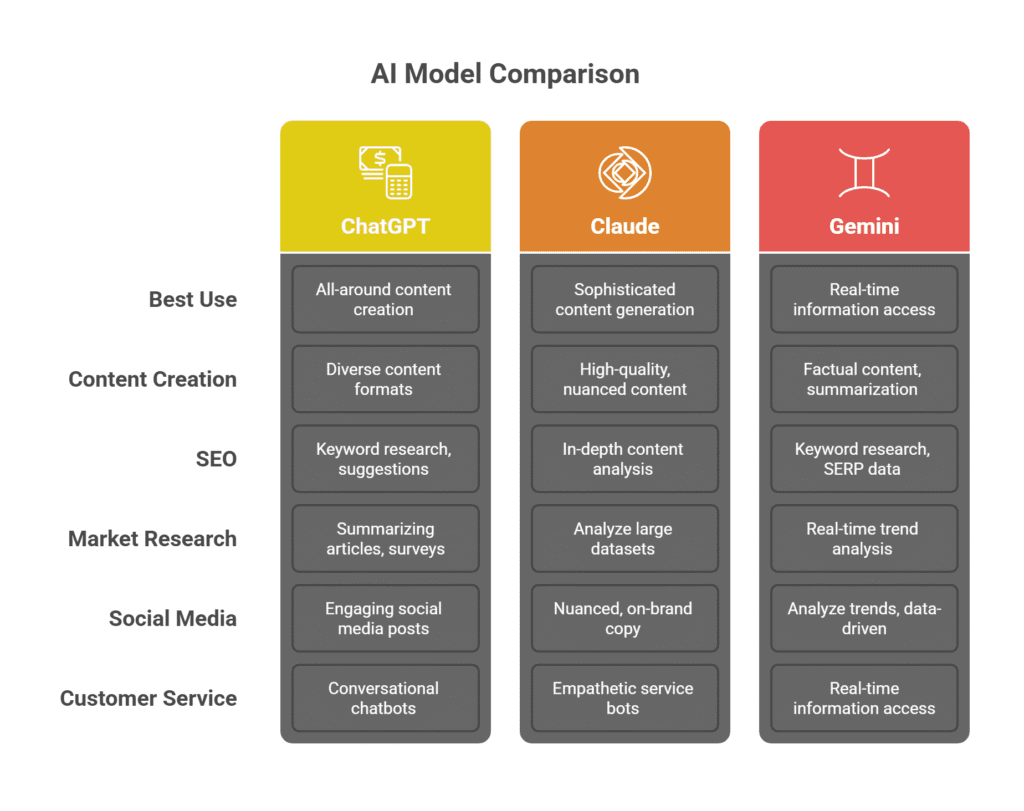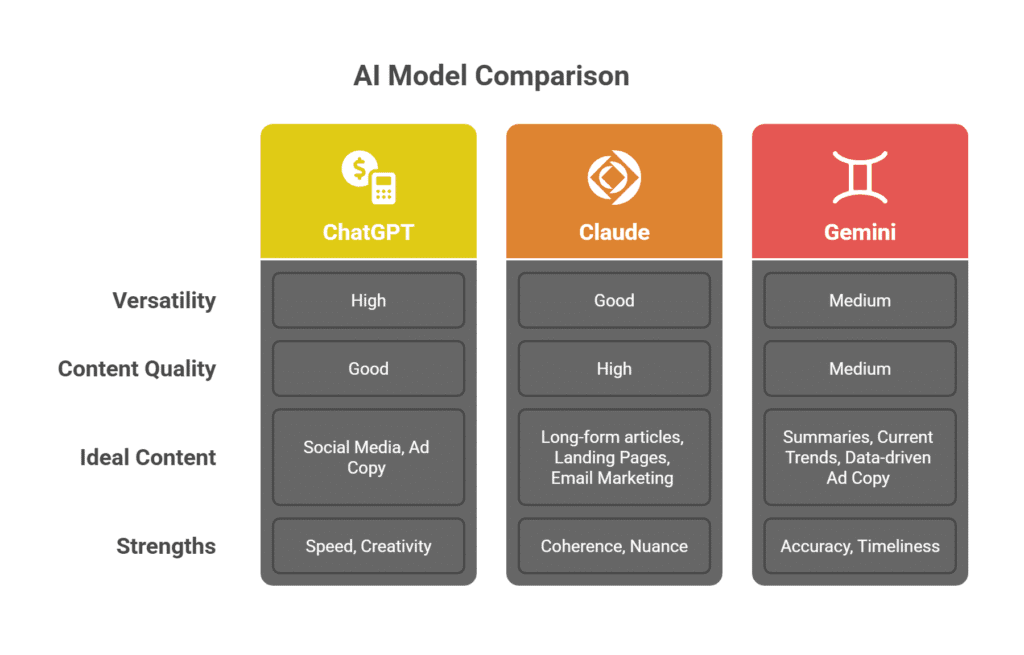We’re in a time where artificial intelligence has moved from science fiction to a key marketing tool. As digital experts, you’re deciding which AI to use for your marketing.
Three top ai language models are changing marketing. OpenAI’s model is the best overall. Anthropic’s is great for creating content and coding. Google’s is the most affordable and good for videos.
We’ve tested these AI models in real marketing situations. This detailed comparison will show you what each can do, what they can’t, and when to use them.
Whether you’re making engaging content, improving campaigns, or checking results, knowing these differences is key. It will really affect your marketing success. Let’s see which AI is right for your marketing needs.
Key Takeaways
- Recent testing shows each AI has its own strengths for marketing tasks
- Anthropic’s model is best for content and coding, while OpenAI’s is great for everyday help
- Google’s platform is the best value and excels in video creation
- OpenAI’s model is currently the best for making images
- Costs vary a lot between platforms, affecting marketing budgets
- Each AI model is suited for different marketing tasks, making the right choice important
Understanding AI Language Models for Marketing
Before we dive into comparing AI models, let’s understand what makes them good for marketing. These conversational ai systems are key to successful marketing. They process human communication and respond in a way that feels real.
These systems use natural language processing to get the context and nuances of what we say. For marketers, this means creating content that fits your brand and what your audience likes. It’s a big step up from simple automation.
The top three platforms each tackle marketing challenges in their own way. ChatGPT is like a personal AI assistant, great for keeping conversations going and handling long content. It’s perfect for customer service and creating detailed content.
Claude focuses on being safe and logical, making it great for industries that need to be careful. It’s perfect for marketing that needs to be accurate and safe. This makes it a top choice for regulated fields and sensitive messages.
Gemini uses Google’s data to offer solutions that are both affordable and versatile. It’s strong in mixing different types of content and getting the latest info. This is super helpful for quick marketing campaigns and tasks that need natural language skills.

When choosing an AI for marketing, there are three key things to look at. First, the content quality must be high to meet professional standards. Second, your brand voice must be consistent everywhere. Third, the AI needs to know about your industry and your audience.
The best marketing uses AI that keeps up with complex conversations. It needs to understand your brand’s needs and connect with your audience. It can’t just give generic answers.
Each AI model is good for different marketing tasks, but not all. Knowing what each model can do helps you pick the right one for your goals and how you work.
ChatGPT o3 Overview and Marketing Capabilities
ChatGPT o3 changes how marketing teams create content and plan campaigns. It uses advanced AI to solve complex problems. This model from OpenAI is a big step forward in AI technology.
The model keeps track of conversations well. This is great for planning big campaigns. Marketing pros can discuss strategies without losing important details.
Core Features and Strengths
ChatGPT o3 has breakthrough capabilities that make it stand out. It remembers your preferences and past talks. This makes marketing work more personal and tailored to your needs.
It can now handle complex marketing tasks better. The model breaks down tough problems into smaller parts. This makes it easier to plan and execute strategies.
Visual content creation gets a big boost with DALL-E integration. Marketing teams can make custom graphics and social media posts right in their workflow. This saves time by not having to switch between different tools.
The way you talk to it feels natural and easy. Marketing pros feel like they’re working with a team member, not just using software. This leads to creative ideas and new insights.
Marketing-Specific Applications
Email marketing is a key area where ChatGPT o3 shines. It knows how to grab attention with subject lines and write copy that converts. This boosts open rates and turns readers into customers.
Planning campaigns is more strategic and detailed. The AI keeps track of long planning sessions. You can try different ideas and refine plans without starting over.
Content personalization is more advanced than ever. The model adjusts its output to fit your brand and audience. This keeps your marketing materials consistent and professional.
Social media content creation also benefits. ChatGPT o3 knows how to adjust tone and style for different platforms. Whether it’s LinkedIn, Twitter, or Instagram, it gets it right.
| Marketing Application | Key Benefit | Performance Rating | Best Use Case |
|---|---|---|---|
| Email Marketing | Psychology-driven copy | Excellent | Subject line optimization |
| Campaign Planning | Context retention | Outstanding | Strategy development |
| Visual Content | DALL-E integration | Very Good | Social media graphics |
| Brand Consistency | Memory features | Excellent | Multi-campaign projects |
Market research and competitor analysis get a boost with ChatGPT o3. It can analyze lots of data and find patterns. This helps marketing teams make better decisions based on data.
The platform is great at making many content versions fast. Marketing teams can test different ideas without spending hours. This makes A/B testing and optimization easier and faster.
Claude 4 Overview and Marketing Capabilities
Claude 4 from Anthropic is a top choice for AI in marketing. It creates content that sounds real and fits your brand perfectly. This AI uses smart reasoning and follows ethical rules, making it reliable for marketers.
Claude 4 is a big step up in AI tech. It’s built on Anthropic’s goal to make AI that gets context and stays safe. This means the content it makes feels like it was written by a person, not a machine.
What makes Claude 4 special is how well it gets your brand’s voice. It learns from examples of your company’s style and adapts with great precision. This is super helpful for keeping your marketing consistent everywhere.
Core Features and Strengths
Claude 4 has features that make it great for marketing. It’s really good at long-form content creation, keeping the flow and arguments strong.
Its reasoning skills set it apart from other AI tools. It doesn’t just write content; it thinks about the big picture. This means your marketing messages align with your goals and business plans.
Safety and ethics are at the heart of Claude 4. Anthropic makes sure the content fits your brand’s values and industry standards. This gives you peace of mind when creating content for your customers.
Claude 4 also does well with complex product explanations. It turns technical details into clear benefits with great accuracy. This is really useful for B2B marketing, where you need to communicate complex ideas well.
Marketing-Specific Applications
The platform is best at headline creation and copywriting. Our tests show Claude 4 makes headlines that are real and grab attention. These headlines are true to your brand and get people interested.
For content marketing, Claude 4 is great at writing blog posts and articles. It keeps readers interested with a logical flow and engaging stories. Your audience gets valuable info in a fun and easy way to read.
Email marketing gets a boost from Claude 4 too. It writes subject lines that get more opens and creates newsletter content that drives sales. It knows how to balance promotional stuff with value.
Creating social media content is easier with Claude 4. It adjusts the message for different platforms but keeps your brand’s voice consistent. Whether it’s LinkedIn posts or Instagram captions, Claude 4 gets the tone right.
| Marketing Function | Claude 4 Strength | Key Benefit | Best Use Case |
|---|---|---|---|
| Brand Voice Consistency | Exceptional adaptation to style examples | Maintains authentic communication | Multi-channel campaigns |
| B2B Content Creation | Complex concept simplification | Clear value proposition communication | Enterprise marketing |
| Long-form Content | Logical flow maintenance | Engaging, coherent narratives | Blog posts and whitepapers |
| Headline Generation | Authentic tone production | Higher engagement rates | Advertisement copy |
Claude 4’s focus on ethics is a big plus for big marketing teams. It makes sure complex ideas are explained accurately and persuasively. This makes it perfect for important marketing tasks.
The platform’s skill in nuanced writing sets a new standard for AI in marketing. You can count on Claude 4 to represent your brand well in all marketing efforts. It’s great for everything from getting people’s attention to driving sales.
Gemini 2.5 Pro Overview and Marketing Capabilities
Gemini 2.5 Pro is a top-notch AI solution for tight marketing budgets. It offers quality and function without breaking the bank. Google made it to give you the most bang for your buck, working well in many marketing areas.
Gemini 2.5 Pro uses Google’s huge data pool to stand out. It connects with Google Search for the latest market trends and consumer habits. This lets you make marketing that’s always up-to-date.
The model’s multimodal approach makes working with different content types easy. You can make big marketing plans that use text, images, and videos all together. This means you don’t need lots of separate tools.
Core Features and Strengths
Gemini 2.5 Pro shines in many areas that help marketing teams a lot. It’s great at understanding complex marketing briefs and turning them into solid plans.
Visual content generation is a big plus. Gemini’s AI makes images that look almost like they were shot by pros. This can save you money on creative work while keeping quality high.
The new Veo 3 tech boosts Gemini’s video marketing skills. Now, you can make top-notch videos for social media, ads, and more. This puts Gemini at the forefront of video marketing.
Getting real-time data from Google Search is a big plus. Your marketing can include the latest news, trends, and insights. This keeps your content fresh and relevant.
Marketing-Specific Applications
Gemini 2.5 Pro is a powerhouse in data-driven marketing. Its text generation works with Google’s search data to make content that matches what people are interested in.
Social media marketing gets a boost from Gemini’s ability to work with different content types. You can make campaigns with custom visuals, catchy copy, and videos. The AI keeps your brand message consistent across all your content.
Email marketing campaigns get better with Gemini’s real-time data. It can suggest subject lines and themes based on current trends. This often leads to more people opening your emails and getting involved.
Content marketing gets a boost from Gemini’s deep research skills. The AI can look at what your competitors are doing, find gaps, and suggest topics that will grab your audience’s attention. This research helps your content do better.
Marketing teams on a tight budget will love Gemini for its ability to produce lots of content without costing too much. This lets you try out different marketing ideas and improve your campaigns based on how they do.
Content Creation and Copywriting Performance
Marketing success depends on great content. Our tests show big differences between ChatGPT vs. Claude and ChatGPT vs. Gemini in making content. We looked at each platform in different content types to see which AI makes the best marketing materials.

Our detailed study found that content quality changes a lot based on the marketing task. Each AI has special strengths that can help your campaign and how your brand looks.
Blog Post and Article Writing
Claude is the top choice for writing long articles. Our tests found that Claude writes better lead paragraphs that grab readers right away and sound professional.
It’s great at making headlines that are interesting and specific. Claude mixes numbers with clear problems and solutions, leading to more clicks.
ChatGPT does well in making different types of content. But it sometimes misses understanding the brand voice like Claude does. Gemini’s content is often too long and needs a lot of editing to read well.
Advertisement Copy Generation
When making ad copy, keeping your brand’s voice consistent is key. Our study found that Claude keeps a better brand voice in ads than the others.
Claude avoids the generic AI feel that can hurt your ad’s authenticity. This real tone leads to more engagement and better results.
Comparing ChatGPT vs. Claude for ads, Claude’s messages are more convincing. ChatGPT’s copy works but might need more tweaking to fit your brand.
Social Media Content Creation
Social media needs content that fits each platform well but stays professional. Claude is great at understanding what each platform needs for Facebook, LinkedIn, Twitter, and Instagram.
Our tests show Claude gets the tone and style right for each platform. It makes content that feels like it belongs on each social site while keeping your brand’s voice.
In the ChatGPT vs. Gemini test for social media, ChatGPT offers more variety. But Gemini is cheaper but needs more editing. The main thing for marketing teams is that Claude’s better tone makes it the best for showing your brand on all social sites.
Email Marketing and Campaign Development
Email marketing has changed, needing AI that gets human behavior. It’s a top marketing channel, with businesses making $42 for every dollar spent. AI is key for making and scaling campaigns.
We’ve tested all three platforms for email marketing. ChatGPT shows top performance in understanding subscribers and keeping context in campaigns. It remembers subscribers, making emails personal and adapting over time.
The gemini vs. claude comparison shows different email marketing ways. Claude keeps a consistent brand voice but misses the psychological edge for conversions. Gemini 2.5 Pro is strong, using real-time info for timely newsletters.
Subject Line Optimization
Email subject lines are key to success. ChatGPT’s understanding of psychology helps it craft subject lines that grab attention. It balances curiosity and clarity well.
ChatGPT knows how to use emotional triggers like urgency and personalization. This boosts engagement rates. Claude’s subject lines are structured but sometimes miss the emotional touch. Gemini 2.5 Pro offers creative lines but can be too long for mobile.
Newsletter Content Creation
Creating consistent newsletters is a challenge. ChatGPT does it well, mixing promotional and valuable content. It keeps subscribers interested without making them unsubscribe.
ChatGPT’s memory is great for newsletters. It remembers what subscribers like and what they’ve interacted with. This makes content personal and evolves with the audience.
Gemini 2.5 Pro is good for newsletters, using current events. But it can be too long. Claude keeps a consistent brand voice but misses the conversion edge. For email marketing, ChatGPT’s understanding and personalization make it the best choice.
SEO Content Optimization Capabilities
AI and SEO meet in a special way on different platforms. Marketing teams need AI that gets both search engines and what users want. We’ve seen how each platform balances tech needs and making content fun to read.
SEO is tough for AI models. They must use keywords well but keep content easy to read and real. Each platform tackles this challenge in its own way, with some doing better than others.
Keyword Integration and Optimization
Claude Sonnet 4 is great at adding keywords naturally. It fits them into content smoothly, keeping it easy to read. It also knows how to make content that answers search questions well.
Claude gets the context of keywords. It doesn’t just add them anywhere. It thinks about where they fit in the bigger picture. This makes content that feels real and meets SEO needs.
OpenAI O3 does well in understanding what searchers want. But it sometimes focuses too much on keywords. This can make content feel stiff and less engaging.
Gemini uses Google’s knowledge to help with SEO. It knows what search engines like. But, its content might not be as sharp for top SEO spots.
“Effective SEO content requires balancing technical optimization with authentic, engaging communication – a challenge where superior writing capabilities provide significant advantages in competitive search landscapes.”
Meta Descriptions and Title Tags
Meta descriptions and title tags need to be catchy and SEO-friendly. Claude Sonnet 4 does this well. It knows that good SEO means appealing to people too.
The platform comes up with many meta descriptions. Each one uses keywords well but also keeps things interesting. This helps with search rankings and keeps users engaged.
OpenAI O3 makes meta descriptions that are good for SEO. But, it might not be as good at getting people to click. Marketing teams often have to tweak these to get the best results.
Gemini’s meta descriptions follow Google’s rules but might be a bit too straightforward. It knows the technical side but might miss the creative spark. It’s strong in following rules but not in being creative.
For marketing teams, the key is that SEO is more than just keywords. It’s about making content that works for both search engines and people. Good writing is key to standing out in search results.
ChatGPT vs. Claude vs. Gemini: Direct Performance Comparison
Comparing nine marketing categories, no AI stands out in every area. ChatGPT wins four times, Claude three, and Gemini two. Each AI has unique strengths for different marketing needs.
Understanding each AI’s strengths is key. This way, marketing teams can find the best fit for their goals.
Content Quality and Creativity
Claude leads in creating authentic and creative content. It excels in making engaging headlines and copy. Its content feels human yet professional.
ChatGPT shines in conversational marketing. It remembers more and understands customers better. This makes it great for personalizing customer experiences.
Gemini is good for making lots of content quickly. It’s not as creative as Claude or as personal as ChatGPT. But it’s perfect for businesses needing lots of standard content.
Marketing Strategy Development
ChatGPT’s advanced thinking is key in marketing strategy. Its OpenAI GPT-4o architecture is better at complex analysis. It spots strategic insights that others miss.
ChatGPT is great at connecting data to form strategies. Its AI helps marketers see how campaigns work together. This makes it essential for making big decisions.
Claude is good at coming up with creative strategies. But it can’t match ChatGPT’s analytical skills. For complex data analysis, OpenAI GPT-4o is better.
Gemini is okay for simple strategies. It handles basic tasks well but struggles with complex thinking. For tough marketing challenges, other platforms are better.
Brand Voice Consistency
Claude is best at keeping a brand’s voice consistent. It matches the tone in all types of content. This makes its content feel true to the brand.
Claude gets the brand’s personality, not just its style. It creates content that really shows what the brand is about. This is different from just following a guide.
ChatGPT personalizes content within brand guidelines. It adapts the voice for different audiences while keeping the brand’s core identity. This is useful for reaching various customer groups.
Gemini keeps a brand’s voice consistent for simple needs. It’s not as sophisticated as Claude or adaptable as ChatGPT. But it’s good enough for brands with straightforward voice needs.
Our study shows that using different AIs together works best. Marketing teams get the best results by using Claude for content, ChatGPT for strategy and personalization, and Gemini for scaling visual and video content.
Pricing and Accessibility Analysis
Pricing for ai language models varies a lot, affecting marketing choices. We’ve looked into the financial side of each platform to guide your budgeting. Knowing these costs is key for long-term marketing plans that use AI content.
Price differences can greatly affect your marketing budget. Some models are twenty times more expensive for the same tasks. This forces marketing teams to balance their needs with their budget.
Cost Comparison for Marketing Teams
When planning your budget, consider each platform’s pricing. Gemini 2.5 Flash is the most affordable for making lots of content. Teams that need to produce hundreds of blog posts or social media updates find it very appealing.
ChatGPT has different pricing tiers for various team sizes and usage. The $20 monthly Plus plan is great for most marketing teams. For unlimited access, the $200 monthly Pro plan offers advanced research features.
Claude 4 Sonnet is more expensive but offers top-notch content quality. The 20x cost difference compared to Gemini means you need to think about the return on investment. Many teams use Claude for critical content where quality is more important than cost.
Smart marketing teams use different conversational ai models for different tasks. This way, they save money while keeping quality high across various uses.
| Platform | Monthly Cost | Best Use Case | Cost Per 1000 Words |
|---|---|---|---|
| Gemini 2.5 Flash | $20 – $100 | High-volume content | $0.05 |
| ChatGPT Plus | $20 | General marketing tasks | $0.15 |
| ChatGPT Pro | $200 | Advanced research | $0.25 |
| Claude 4 Sonnet | $300 – $500 | Premium content | $1.00 |
API Access and Integration Options
API access costs and features vary a lot among platforms. Each ai language models provider has different ways to integrate, affecting your total cost. Knowing these options helps plan your technical setup well.
Gemini’s API pricing is based on use, scaling with your content needs. Teams like the predictable costs and clear billing. The API guides are easy to follow for common marketing tools.
ChatGPT’s API pricing is separate from consumer plans. Enterprise teams find it more predictable than subscription models. It offers strong integration with popular marketing tools.
Claude’s API is more expensive but offers great flexibility. Developers like the detailed documentation and support. The higher costs are often worth it for better quality and less revisions.
Integration complexity adds to your costs beyond platform fees. Think about developer time, maintenance, and training when calculating total costs. Some platforms are easy to set up, while others need a lot of customization.
Most conversational ai platforms offer free trials or API credits for testing. It’s wise to test integration workflows before committing to long-term contracts. This avoids unexpected costs during full deployment.
When budgeting, consider your scaling needs as your marketing grows. Platforms with flexible pricing adapt better to changing needs. Fixed-cost solutions can become expensive as your content volume grows.
User Experience and Interface Evaluation
When looking at AI for marketing, how easy it is to use matters more than its power. The design and ease of use of generative ai tools affect how well marketing teams use them. A good AI model is useless if it’s hard to navigate or use.
Each AI platform has its own way of working with users. ChatGPT makes it feel like you’re having a real conversation. Claude is all about clear, step-by-step thinking. Gemini works well with Google tools, making it easy for those who already use them.
Ease of Use for Marketing Professionals
ChatGPT has the simplest interface for marketing teams. It’s like talking to a friend, making it easy to brainstorm. Just type in your problem, and you get helpful answers. It remembers what you’ve said before, so you don’t have to explain everything again.
Claude is great for those who like to plan things out. It helps you think through your marketing ideas step by step. This makes you feel more confident when creating content for your brand.
Gemini is good for teams already using Google. It feels like home if you’re used to Google’s style. But, it might not be as polished as other AI tools, which can slow things down.
Marketing pros like tools that make things easier. Natural language processing lets you talk to the AI like you would a person. But, how the AI responds can be different. ChatGPT is great at keeping a conversation going, while Claude explains its thought process.
Learning Curve and Training Requirements
How easy it is to start using each platform varies. ChatGPT is quick to get started with because it’s so easy to talk to. You can start making good prompts right away. The main thing to learn is how to ask the right questions.
Claude needs you to understand how it works to get the best results. This takes a bit more time to learn. But, it’s worth it for complex marketing plans or brand guidelines.
Gemini’s learning curve depends on how well you know Google. If you already use Google Ads, Analytics, and Workspace, it’s easy. But, if you’re new to Google, it might take longer to get used to.
For teams that want to start using AI fast, ChatGPT is the best choice. If you like to plan things out and want detailed answers, Claude might be better. It all comes down to what your team prefers and how you work.
Integration with Marketing Tools and Platforms
The success of AI in marketing depends on how well it works with your tools. Marketing teams use many tools like CRM systems, email platforms, and analytics software. When picking ai assistants, how well they integrate is key.
Each AI tool has different API access and compatibility. Your choice should match your current tools and workflow. We’ve looked at how ChatGPT, Claude, and Gemini work with common marketing tools to help you choose.
CRM and Email Platform Compatibility
ChatGPT works well with big CRM systems like Salesforce and HubSpot. Its memory capabilities keep customer info across touchpoints. This helps with lead scoring, email responses, and keeping customer history.
Claude is great for content management and email platforms. Its language understanding is perfect for newsletters and blog posts. Teams using Mailchimp or Constant Contact will like Claude’s writing and context.
Gemini fits well with Google’s tools. If you use Google Analytics or Gmail, Gemini makes data flow easy. This is great for teams using Google tools.
Social Media Management Integration
Social media needs different strengths from ai assistants. ChatGPT is great for customer service on platforms like Hootsuite. It responds quickly and improves social listening.
Claude is best for creating social media content. Its advanced language understanding keeps your brand voice consistent. Teams using Buffer or Later will like Claude’s content adaptation.
Gemini is good for making lots of social media content. It’s perfect for big social campaigns. Its Google integration is a big plus for agencies or big companies.
When picking ai assistants, look at your current tools first. How well they integrate is more important than their features. Think about your team’s skills, budget, and future plans before deciding.
Limitations and Considerations for Marketing Use
Marketing teams using AI for content creation face big challenges. These tools are great at text generation but need careful handling. This ensures brand integrity and campaign success.
We found big accuracy problems with all major AI tools. These issues can hurt content quality and brand trust if not managed well.
Accuracy and Fact-Checking Requirements
All AI platforms we tested had accuracy issues. This is a big risk for marketing content. Statistical misattribution is a major problem, mixing up data in ways that seem right but aren’t.
DeepSeek was the worst at mixing up data from different sources. This makes content seem credible but can harm your brand’s reputation.
Even with advanced reasoning in AI, human checks are needed. All platforms need strict fact-checking, mainly for data and research claims.
Marketing teams must have thorough review steps before publishing AI content. They need to check numbers, sources, and make sure content fits current standards.
Brand Safety and Content Moderation
Brand safety varies with AI platforms. Claude has better ethical rules, while others need more human oversight.
Content moderation is tough, more so in sensitive areas or with controversial topics. AI might miss issues that humans catch.
We saw that all platforms struggle with complex brand guidelines. They might create content that’s technically okay but doesn’t match brand standards.
| Limitation Category | ChatGPT Impact | Claude Impact | Gemini Impact | Mitigation Strategy |
|---|---|---|---|---|
| Factual Accuracy | Moderate risk | Lower risk | Moderate risk | Mandatory fact-checking |
| Brand Voice Consistency | High variability | Better consistency | Moderate variability | Detailed style guides |
| Content Moderation | Standard filters | Enhanced safety | Standard filters | Human review process |
| Source Attribution | Often missing | Better tracking | Inconsistent | Manual verification |
AI should augment human judgment in marketing, not replace it. This is key for content that reflects brand values or makes factual claims.
Conclusion
The chatgpt vs. claude vs. gemini debate shows us something important. No one platform is best for everything. Success comes from mixing and matching, not picking just one.
ChatGPT is great for talking to customers and making emails better. It uses psychology to make messages more engaging. Claude is the top choice for creating content that sounds like your brand. It’s perfect for blog posts and social media.
Gemini is the go-to for saving money when you need a lot. It’s good for making lots of visual content and keeping information up to date.
We suggest using a mix of these AI tools. Use Claude for top-notch content. ChatGPT is best for planning and personalizing. And Gemini for making lots of visual stuff.
This way, you get the most out of each tool while keeping costs down. Remember, AI helps us be more creative, not replace us. Your ideas and planning are key.
These tools are always getting better. Keep up with new features and try them out. This will help you stay ahead in the fast-changing world of AI marketing.
Begin with the tool that fits your needs right now. Then, as you learn more, add more tools to your collection.
FAQ
Which AI model is best for marketing content creation overall?
Claude 4 is the top pick for marketing content. It creates content that sounds like it was written by a human. This is key for blog posts, social media, and professional emails.
What’s the most cost-effective AI solution for marketing teams on a budget?
Gemini 2.5 Pro is the best value for marketing teams. It’s cheaper than others but might need more editing. Gemini 2.5 Flash is great for making lots of content fast, even if it’s more expensive.
Which AI model performs best for email marketing campaigns?
ChatGPT o3 is top for email marketing. It gets how to make emails open better and keeps track of what subscribers like. This makes emails more personal and engaging.
How do these AI models compare for SEO content optimization?
Claude Sonnet 4 is best for SEO. It fits keywords naturally and keeps content easy to read. It also makes sure content meets search intent and is engaging.
Can I use multiple AI models together for different marketing tasks?
Yes, mixing AI models works well. Use Claude for top-notch content and ChatGPT for strategy and customer interactions. Gemini is good for making lots of visual content without spending too much.
What are the main limitations I should be aware of when using AI for marketing?
AI can make mistakes that hurt your brand’s image. Always check the facts. Also, AI might not always get your brand’s unique style right, so you need to review its work carefully.
Which AI model has the best integration capabilities with existing marketing tools?
ChatGPT works well with CRM systems because it remembers customer details. Claude fits well with content management systems and email tools. Gemini is great with Google tools like Analytics and Ads.
How steep is the learning curve for marketing professionals using these AI tools?
ChatGPT is easy to get used to because it talks like a human. Claude is structured and systematic, which is good for some people. Gemini is easy if you already know Google tools.
Which AI model is best for generating marketing strategies and campaign planning?
ChatGPT o3 is great for planning marketing strategies. It finds insights that others miss. It’s also good at understanding complex marketing plans and remembering details.
How do these conversational AI tools compare for social media marketing?
Claude is best for social media because it knows how to talk like people do on different platforms. ChatGPT is good for customer service on social media. Gemini is cheap for making lots of social media content but needs editing.
What makes these AI language models effective for marketing applications?
Good marketing AI keeps track of conversations, understands brand needs, and connects with audiences. It’s all about natural language, keeping a consistent brand voice, and knowing marketing well.
Are there specific pricing considerations for marketing teams choosing between these AI assistants?
ChatGPT has different prices, with a $20/month plan for most teams and a $200/month plan for more users. Claude is more expensive but offers better content quality. Gemini is the cheapest option for teams watching their budget.





